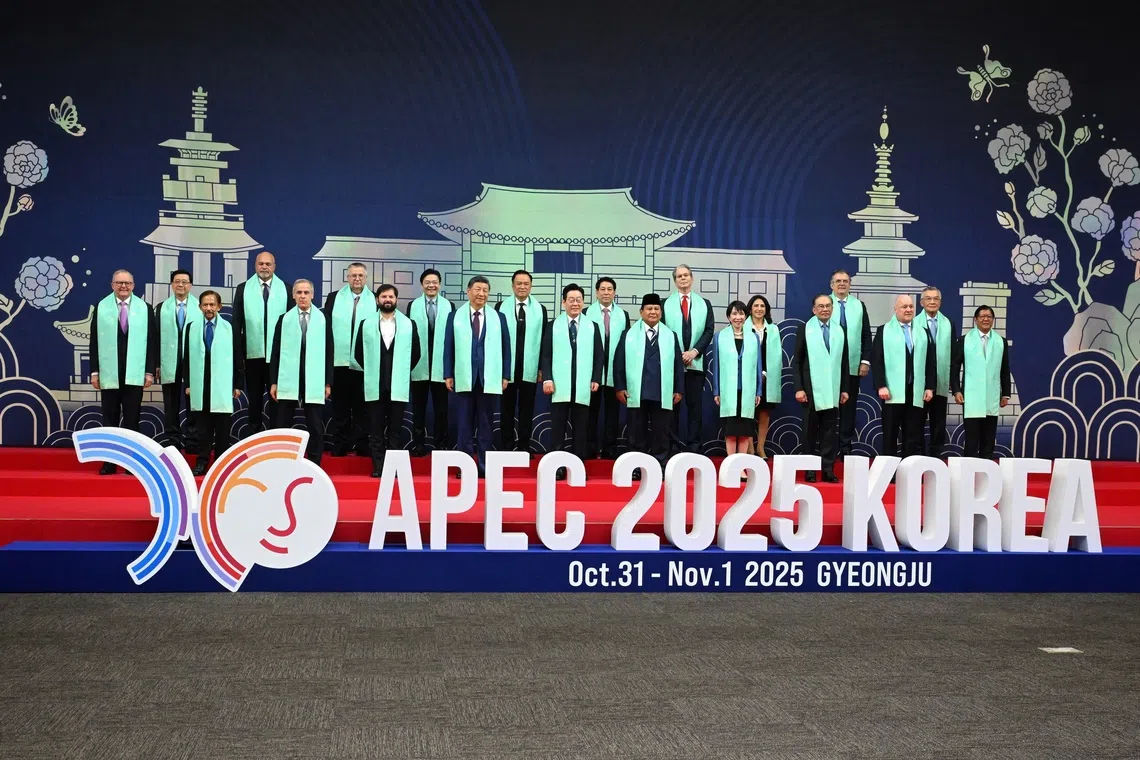Asia-Pacific leaders call for shared trade benefits as Apec summit wraps up
Sign up now: Get insights on Asia's fast-moving developments

The Apec leaders summit unfolded under the shadow of rising geopolitical tensions and aggressive economic strategies.
ST PHOTO: CHONG JUN LIANG
GYEONGJU, South Korea - Facing deepening fractures in the global trade order, Asia-Pacific leaders adopted a joint declaration that emphasised the need for resilience and shared benefits in trade at the end of the annual Asia-Pacific Economic Cooperation (Apec) summit on Nov 1.
The Apec leaders summit, hosted by South Korea in 2025, unfolded under the shadow of rising geopolitical tensions and aggressive economic strategies - ranging from US tariffs to China's export controls - that have pressured global trade.
Ahead of the gathering, US President Donald Trump announced trade deals with a number of countries, including China and South Korea. But he left before the summit kicked off
Washington's views were, however, still on display in the declaration, analysts said, which, unlike 2024's document, did not mention multilateralism or the World Trade Organisation.
“It is a result of member countries acknowledging, at least to some degree, that it will be difficult to restore a free trade order based on multilateralism and the World Trade Organization,” said Dr Heo Yoon, a professor of international trade at Sogang University in Seoul.
“We cannot deny anymore that there is a paradigm shift in the global trade order,” Dr Heo added.
With Mr Trump's swift exit before the leaders’ summit, China positioned itself as a steady advocate of free and open trade, a role the US has dominated for decades.
China will host Apec in Shenzhen in 2026, Chinese President Xi Jinping announced.
However, Dr Heo and analysts say the joint declaration suggests that member nations were wary of giving an impression that the US was undermining free trade while picturing China as a guardian of multilateralism.
“Few countries believe there can be a new trade order that excludes the US,” he said.
South Korea’s Lee hosts Xi Jinping
China's Xi will wrap up his three-day visit to South Korea on Nov 1 with a state dinner and summit hosted by President Lee Jae Myung, the newly elected US ally who has pledged to balance Seoul's ties with Beijing.
The stakes are high for Mr Lee, who assumed office in June
Mr Lee faces the dual challenge of protecting South Korea's export-driven economy and lowering tensions with North Korea amid rising China-US competition.
Mr Lee said it was difficult to say that relations between Seoul and Beijing had ever been completely normalised, and he hoped for a substantial improvement.
“We must go beyond simple restoration to find a path of cooperation that is beneficial to each other,” Mr Lee told a press conference ahead of his planned meeting with Mr Xi.
Earlier this week, Mr Lee also hosted Mr Trump
Mr Lee is set to hold similar events for Mr Xi on Nov 1, including a summit meeting and state dinner. This is Mr Xi's first visit to South Korea in 11 years.
Seoul is a key US military ally, hosting thousands of American troops and relying on the US nuclear umbrella for protection from nuclear-armed North Korea.
Yet its economy is deeply entwined with not just the US, but also China, which has grown increasingly challenging for South Korean companies and wields influence over North Korea.
North Korea on agenda
Mr Lee's office has said that he and Mr Xi will discuss the denuclearisation of the Korean peninsula, a diplomatic phrase used to refer to North Korea's nuclear weapons, which are banned by United Nations Security Council resolutions.
Pyongyang, a military and economic ally of China, issued a statement on Nov 1 dismissing the denuclearisation agenda as an unrealisable “pipe dream”.
Mr Trump had offered to meet with North Korean leader Kim Jong Un during his visit to South Korea, but Pyongyang did not make a public response
Mr Trump met with Mr Xi on Oct 30
The Chinese president also held talks with the leaders of Japan, Canada, and Thailand.
In closing remarks at Apec, Mr Xi proposed the establishment of a World Artificial Intelligence Cooperation Organisation


